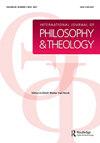Religion, patriarchy and the prospect for gender equality in South Africa
IF 0.3
0 PHILOSOPHY
International Journal of Philosophy and Theology
Pub Date : 2021-10-20
DOI:10.1080/21692327.2021.2003231
引用次数: 0
Abstract
ABSTRACT Religion is both valuable and influential to the organization of society. It affects, not only how people relate to God, but also how they relate to each other. In this paper, I examine the relationship between religion and society in relation to gender inequality. I argue that the patriarchal nature and organization of religion influences and perpetuates gender inequality in the broader social context, especially in a country as religious as South Africa. Since, for religion, a meaningful life is believed to be a life that fulfills God’s will, adherents of religion subscribe to these patriarchal notions because they are believed to be coming from God. The implication for South Africa is that, while it is considered to be a liberal state, its state of religiousness makes it difficult for equality to be realized from a purely liberal position. Therefore, to begin addressing this issue, I maintain that the application of a feminist standpoint approach to religion can be helpful in: 1) realizing the extent to which gender inequality exists in religion and its patriarchal contribution in society and 2) providing a method in which women’s experiences and relations to religion are taken into consideration.宗教、父权制和南非性别平等的前景
宗教对社会组织具有重要的价值和影响。它不仅影响人们与上帝的关系,也影响人们与他人的关系。在本文中,我考察了宗教与社会在性别不平等方面的关系。我认为,宗教的父权性质和组织在更广泛的社会背景下影响并延续了性别不平等,特别是在像南非这样一个宗教虔诚的国家。因为,对于宗教来说,一个有意义的生命被认为是一个实现上帝意志的生命,宗教的信徒赞成这些父权观念,因为他们被认为是来自上帝。这对南非的暗示是,虽然它被认为是一个自由国家,但其宗教状态使得从纯粹的自由立场实现平等变得困难。因此,为了开始解决这个问题,我认为将女权主义立场的方法应用于宗教可以在以下方面有所帮助:1)认识到宗教中性别不平等的存在程度及其在社会中的父权制贡献;2)提供一种考虑女性经历和与宗教关系的方法。
本文章由计算机程序翻译,如有差异,请以英文原文为准。
求助全文
约1分钟内获得全文
求助全文
来源期刊

International Journal of Philosophy and Theology
PHILOSOPHY-
CiteScore
0.30
自引率
0.00%
发文量
12
期刊介绍:
International Journal of Philosophy and Theology publishes scholarly articles and reviews that concern the intersection between philosophy and theology. It aims to stimulate the creative discussion between various traditions, for example the analytical and the continental traditions. Articles should exhibit high-level scholarship but should be readable for those coming from other philosophical traditions. Fields of interest are: philosophy, especially philosophy of religion, metaphysics, and philosophical ethics, and systematic theology, for example fundamental theology, dogmatic and moral theology. Contributions focusing on the history of these disciplines are also welcome, especially when they are relevant to contemporary discussions.
 求助内容:
求助内容: 应助结果提醒方式:
应助结果提醒方式:


